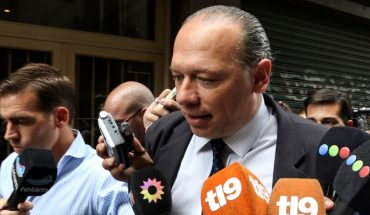“Argentina al diván”, the comedy by Marcelo Cotton in free version by Daniel Casablanca, Diego Reinhold and Guadalupe Bervih is at the ND Teatro with performances on Fridays and Saturdays at 8:30 p.m. The proposal of the work is to make a journey through the enormous Argentine experience, to amuse us, move us and give the viewer a misaligned cry: “To the great I can Argentine… mental!” In conversation with Filo.News, Diego Reinhold and Daniel Casablanca tell us about the challenges of the play, how they are experiencing the performances and why it is necessary to return to the history of our country through humor and comedy. “We feel that it’s like a communion that happens in the theater, it’s very exciting,” says Casablanca, who in his character represents Argentina, through different eras, with changes of costumes and scenery. In addition, he adds that in the free version they made, they included their own jokes and the staging, “it is a show where the commitment is total,” he says. For his part, Diego Reinhold, who plays a psychiatrist, the son of a moderately well-known psychiatrist father, tries to psychoanalyze Argentina, in search of his origins, and his parents. “It’s a pleasure to be able to do this play in such a complex context, to be able to laugh at ourselves and talk about what’s happening to us as a country.”
Being a work that involves both history and psychoanalysis seen from the perspective of humor, what were the challenges you faced? Daniel C: The challenge or the fear we had was that we are telling the story of our country and from the point of view of humor, what we are telling is still a tragicomedy. We kept wondering if what we’re telling was funny because it’s a bit terrible, any story of a country. We wanted to be as accurate and precise as possible. Diego R: We also didn’t want to leave anyone out, our commitment was to make sure that everyone feels that they can enjoy the show beyond the political thoughts that the audience may have in all its variety, and at the same time to be able to achieve a show of reflection. Since the work asks about the Argentine, what is the Argentinian like for you? Daniel C: The Argentinian is very critical, very angry. He plays it quite well in the role of the therapist, who knows everything, who doesn’t deserve to live the way he lives but deserves more, he is demanding of the country. All those characteristics that are also reflected when in December 2022 we were celebrating a world championship and everyone was in the street, and then the following year it was chaos, everything divided. Diego R: Yes, I agree. The Argentinian a lot, he doesn’t like his country, but in reality you have to understand that that comes back to you, because you are part of that too. So we have to think about whether we want to continue to speak ill of our country or make a positive change. Taking into account that the work covers from the origins of our country to the end of the 90’s. Why do you think it is necessary to review Argentina’s history? Daniel C: Because nowadays it seems that you can’t talk about politics, that it’s difficult, there’s a lot of depth of shouting and no one listens to each other anymore. There came a time when it was emptied of content and everything is violence. So our proposal is to go a little further, to get out of the crack, and maybe there you can think out loud with the other. Diego R: Well, when you go to do a therapeutic consultation, you also go for a certain loss of meaning that you begin to feel. So in therapy you begin to work with your origins, with your images, with what you freely associate with what you have in your mind, which is all disordered. You have to work with the past to know how you got here. We do the same exercise with Argentina as if it were a person. What was the decision to cut the work at that historical stage and not continue until the present? Diego R: I think everyone agrees that it’s a good thing we ended up there. We wrote the play during the pandemic and we didn’t know what was going to happen with the presidential elections. In addition to the fact that as authors what we are experiencing is still a bewilderment, we cannot laugh at what is happening. Daniel C: That’s it, it’s all said and done. We don’t need to count more to see the merry-go-round and the cycles of Argentina. I think it’s more important to think about the birth, about not remembering his father, his mother, and help with that. Then it stops being something that has to do with theatricality, with poetry, it is journalistic. Diego, with respect to the character of the psychiatrist, how was the construction of the role? Diego R: It was a bit of a reliance on this idea that you ask anyone what is there that hasHe is going to tell you his ideas, and it seems that everyone knows perfectly well what should be done with Argentina, although he is surely not going to hit the nail on the head. Because all the politicians came here to promise us that this was the way and that there is a black tunnel and then there is the light. So, I took that idea to the psychiatrist, who also knows what specific treatments to apply and well in the end he falls by the well with it until they become one thing. For your part, Daniel, how was the creation of Argentina? Daniel C: The truth is that people leave excited because it’s a surprise to physically see a person we love, that we get angry, that we let them steal from them, as if it happened to them and not to us. All those chips fall on you in the show. And then I think I took a lot of things from my aunt, from my mom. Argentina is an unstable person, who has a significant deficit, who is rich but then loses everything because he does not know how to manage, and they steal from him, he is exposed because of that. How are you living the experience of working in theater and why do you continue to choose that medium to shine as actors? Diego R: It’s a mystical experience, almost like lysergic and that’s something so special and dreamlike, that it’s always a dream come true. I recommend everyone to go through the experience. It’s a very special moment where I feel connected to something that is not in this world, something very spiritual. This work makes me not feel like it’s a job, but we get on the roller coaster and until it’s over we almost don’t have time to question anything. I feel like I’m taking off Diego’s suit for a moment and I’m my Higher Self.Daniel C: We also highlight the affection of the people when we left the play, they tell us that they were excited, that they were surprised. You don’t feel like you made an effort.
The show has a future that has no brakes, that is not the owner of the results, but the truth is that here it feels a very heartfelt show and that until the end it flies by.
Original source in Spanish
“Argentina on the Divan”: a comedy that reflects on the history of our country
March 28, 2024 |





